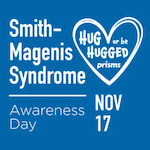SMS Awareness Day Date in the current year: November 17, 2026
 SMS Awareness Day is observed annually on November 17 to raise awareness of Smith-Magenis syndrome, a rare genetic neurobehavioral disorder caused by a microdeletion in the short arm of chromosome 17.
SMS Awareness Day is observed annually on November 17 to raise awareness of Smith-Magenis syndrome, a rare genetic neurobehavioral disorder caused by a microdeletion in the short arm of chromosome 17.Smith-Magenis syndrome (SMS), also known as 17p-microdeletion syndrome, is characterized by the absence of genetic material in chromosomal region 17p11.2, which affects the RAI1 gene. This microdeletion is usually spontaneous (de novo) rather than inherited. The syndrome is named after Ann Smith and Ruth Ellen Magenis, who first described the condition in 1986.
SMS affects an estimated one out of every 15,000 to 25,000 births, making it a rare disorder. As with many rare genetic disorders, the actual incidence may be higher due to underdiagnosis. The most common features of SMS are dysmorphic facial features, developmental delay, intellectual disability, sleep disturbances, and behavioral problems.
Patients with SMS typically exhibit the following physical characteristics: a broad forehead, deep-set eyes, large cheeks, a prominent jaw, a short, upturned nose, and a broad, tented upper lip with a downturned mouth.
Behavioral problems commonly observed in patients with SMS include self-harm (e.g., skin pinching, biting, hitting, and head banging), impulsiveness, frequent temper tantrums and outbursts, fidgeting, anger, compulsive behavior, difficulty paying attention, and repetitive self-hugging.
Outside of outbursts, patients with SMS typically have engaging and endearing personalities with a great sense of humor. They are sensitive to others and eager to please. Individuals with SMS have an excellent long-term memory for names, places, events, and facts.
Other common characteristics of SMS include low muscle tone, poor gross and fine motor skills, feeding difficulties, speech delays, short fingers and toes, gait abnormalities, scoliosis, vision and hearing impairments, middle ear abnormalities, a hoarse and deep voice, decreased sensitivity to pain and temperature, and gastrointestinal problems.
Like most genetic diseases, SMS currently has no cure. Treatment is supportive and tailored to each patient’s symptoms by a multidisciplinary team. It may include early special education, speech and occupational therapy, physical therapy, behavioral therapy, and family counseling. Sleep disturbances are usually addressed through strict sleep routines and medications such as melatonin and trazodone. Medical problems such as scoliosis, hearing impairment, gastrointestinal issues, and others are treated according to standard clinical protocols.
With comprehensive care, individuals can partially improve their behavior, learning, and quality of life. However, the disorder is lifelong, so support is required throughout patients’ lifetimes. Life expectancy in SMS is not precisely defined because it varies with the severity of medical complications and the quality of supportive care. With appropriate care, patients whose major organs are not severely affected can live to middle age and beyond.
SMS Awareness Day was created to raise awareness and improve understanding of Smith-Magenis syndrome worldwide. It is supported by numerous SMS organizations, including PRISMS (Parents and Researchers Interested in Smith-Magenis Syndrome), the SMS Research Foundation, the SMS Foundation UK, and SMS Australia.
- Category
- International Observances
- Tags
- SMS Awareness Day, international observances, rare diseases, awareness days, Smith-Magenis syndrome